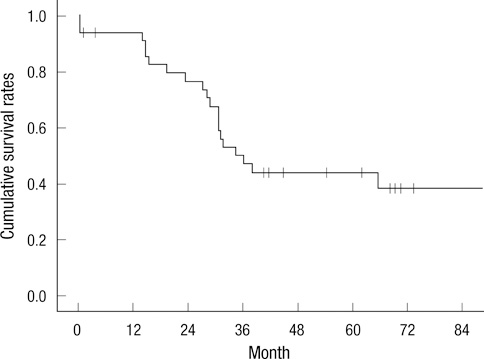J Korean Med Sci.
2012 May;27(5):495-499. 10.3346/jkms.2012.27.5.495.
Prognostic Significance of Angiogenesis by Chalkley Counting in Node Negative Cancer of the Ampulla of Vater
- Affiliations
-
- 1Pancreatobiliary Cancer Clinic, Department of Surgery, Gangnam Severance Hospital, Yonsei University Health System, Seoul, Korea. yds6110@yuhs.ac
- 2Department of Pathology, Gangnam Severance Hospital, Yonsei University Health System, Seoul, Korea.
- KMID: 1372790
- DOI: http://doi.org/10.3346/jkms.2012.27.5.495
Abstract
- Angiogenesis is essential for tumor growth and metastasis. Currently, the Chalkley assay with CD34 immunostaining is the proposed standard method for angiogenesis quantification in solid tumor sections. The purpose of this study was to evaluate the expression of CD34 and its prognostic significance using the Chalkley method in node negative carcinoma of the ampulla of Vater. Between January 1997 and December 2006, 56 node negative patients who had curative resection for carcinoma of the ampulla of Vater were retrospectively reviewed. The Chalkley count was expressed as the mean value of the three counts for each tumor and further divided into two groups according to the mean value of the Chalkley count: low < 4 or high > or = 4. The mean Chalkley count value was 4.0 (+/- 3.1). In the low Chalkley group, the 1- and 3-yr recurrence rates were 18.3%, 47.6% respectively; in the high Chalkley group, the 1- and 3-yr recurrence rates were 26.5% and 60.6% respectively. Only high Chalkley count had statistical significance as a factor in recurrence of node negative ampulla of Vater carcinoma. Assessment of angiogenesis may have an important role in the prognostic evaluation of node negative cancer of the ampulla of Vater.
Keyword
MeSH Terms
-
Adult
Aged
Ampulla of Vater/metabolism/*pathology
Antigens, CD34/metabolism
Carcinoma/metabolism/mortality/*pathology
Common Bile Duct Neoplasms/metabolism/mortality/*pathology
Disease-Free Survival
Female
Humans
Lymphatic Metastasis
Male
Middle Aged
*Neovascularization, Pathologic
Predictive Value of Tests
Prognosis
Recurrence
Retrospective Studies
Figure
Reference
-
1. Willett CG, Warshaw AL, Convery K, Compton CC. Patterns of failure after pancreaticoduodenectomy for ampullary carcinoma. Surg Gynecol Obstet. 1993. 176:33–38.2. Yeo CJ, Sohn TA, Cameron JL, Hruban RH, Lillemoe KD, Pitt HA. Periampullary adenocarcinoma: analysis of 5-year survivors. Ann Surg. 1998. 227:821–831.3. Bergers G, Benjamin LE. Tumorigenesis and the angiogenic switch. Nat Rev Cancer. 2003. 3:401–410.4. Weidner N, Semple JP, Welch WR, Folkman J. Tumor angiogenesis and metastasis: correlation in invasive breast carcinoma. N Engl J Med. 1991. 324:1–8.5. Vermeulen PB, Gasparini G, Fox SB, Colpaert C, Marson LP, Gion M, Beliën JA, De Waal RM, Van Marck E, Magnani E, et al. Second international consensus on the methodology and criteria of evaluation of angiogenesis quantification in solid human tumours. Eur J Cancer. 2002. 38:1564–1579.6. Bosari S, Lee AK, DeLellis RA, Wiley BD, Heatley GJ, Silverman ML. Microvessel quantitation and prognosis in invasive breast carcinoma. Hum Pathol. 1992. 23:755–761.7. Horak ER, Leek R, Klenk N, LeJeune S, Smith K, Stuart N, Greenall M, Stepniewska K, Harris AL. Angiogenesis, assessed by platelet/endothelial cell adhesion molecule antibodies, as indicator of node metastases and survival in breast cancer. Lancet. 1992. 340:1120–1124.8. Hansen S, Grabau DA, Sorensen FB, Bak M, Vach W, Rose C. The prognostic value of angiogenesis by Chalkley counting in a confirmatory study design on 836 breast cancer patients. Clin Cancer Res. 2000. 6:139–146.9. Fox SB, Leek RD, Smith K, Hollyer J, Greenall M, Harris AL. Tumor angiogenesis in node-negative breast carcinomas-relationship with epidermal growth factor receptor, estrogen receptor, and survival. Breast Cancer Res Treat. 1994. 29:109–116.10. Folkman J. What is the evidence that tumors are angiogenesis dependent? J Natl Cancer Inst. 1990. 82:4–6.11. Brawer MK, Deering RE, Brown M, Preston SD, Bigler SA. Predictors of pathologic stage in prostatic carcinoma. The role of neovascularity. Cancer. 1994. 73:678–687.12. Macchiarini P, Fontanini G, Hardin MJ, Squartini F, Angeletti CA. Relation of neovascularisation to metastasis of non-small-cell lung cancer. Lancet. 1992. 340:145–146.13. Toi M, Kashitani J, Tominaga T. Tumor angiogenesis is an independent prognostic indicator in primary breast carcinoma. Int J Cancer. 1993. 55:371–374.14. Martin L, Green B, Renshaw C, Lowe D, Rudland P, Leinster SJ, Winstanley J. Examining the technique of angiogenesis assessment in invasive breast cancer. Br J Cancer. 1997. 76:1046–1054.15. Alvarez AA, Krigman HR, Whitaker RS, Dodge RK, Rodriguez GC. The prognostic significance of angiogenesis in epithelial ovarian carcinoma. Clin Cancer Res. 1999. 5:587–591.16. van Diest PJ, Zevering JP, Zevering LC, Baak JP. Prognostic value of microvessel quantitation in cisplatin treated FIGO 3 and 4 ovarian cancer patients. Pathol Res Pract. 1995. 191:25–30.17. Helin HJ, Helle MJ, Kallioniemi OP, Isola JJ. Immunohistochemical determination of estrogen and progesterone receptors in human breast carcinoma. Correlation with histopathology and DNA flow cytometry. Cancer. 1989. 63:1761–1767.18. Rosenthal LJ. Discrepant estrogen receptor protein levels according to surgical technique. Am J Surg. 1979. 138:680–681.19. Nakayama K, Kanzaki A, Takebayashi Y, Toi M, Bando H, Nabei T, Miyazaki K, Fukumoto M. Different features of angiogenesis between ovarian and breast carcinoma. Cancer Lett. 2001. 170:161–167.
- Full Text Links
- Actions
-
Cited
- CITED
-
- Close
- Share
- Similar articles
-
- Prognostic value of the lymph node metastasis in patients with ampulla of Vater cancer after surgical resection
- Expression of Cyclooxygenase-2 and Its Correlation with Clinicopathologic Factors of Ampulla of Vater Cancer
- Ki-67 and VEGF as Possible Prognostic Factors in Radically-resected Ampulla of Vater Cancer
- Prognostic Factors and Survival Rate of Ampulla of Vater Cancer after Curative Surgery
- Introduction of 7th AJCC TNM Staging for Hepatobiliary, Pancreatic Ampulla of Vater, Exocrine and Endocrine Cancers




